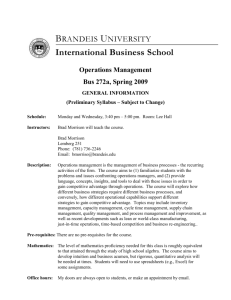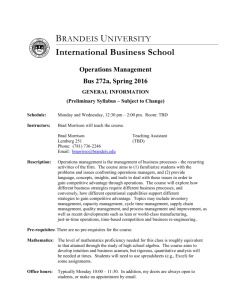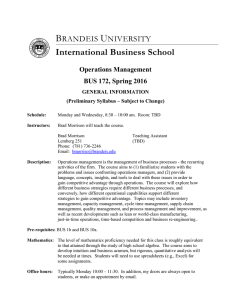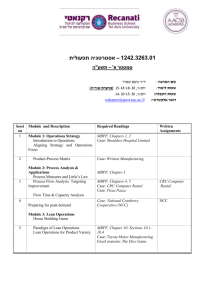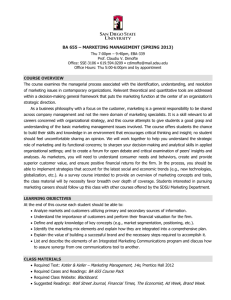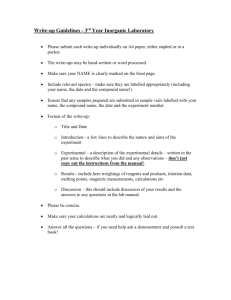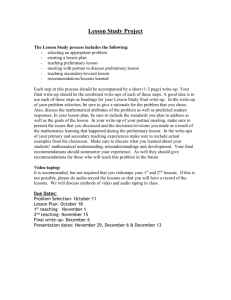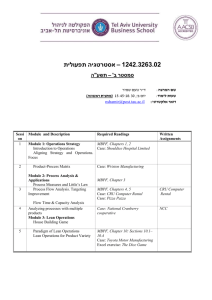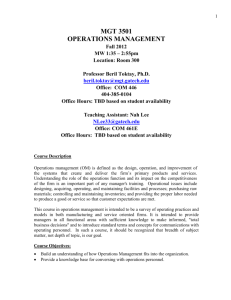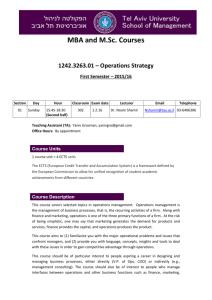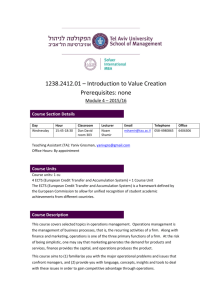Syllabus - Brandeis University
advertisement
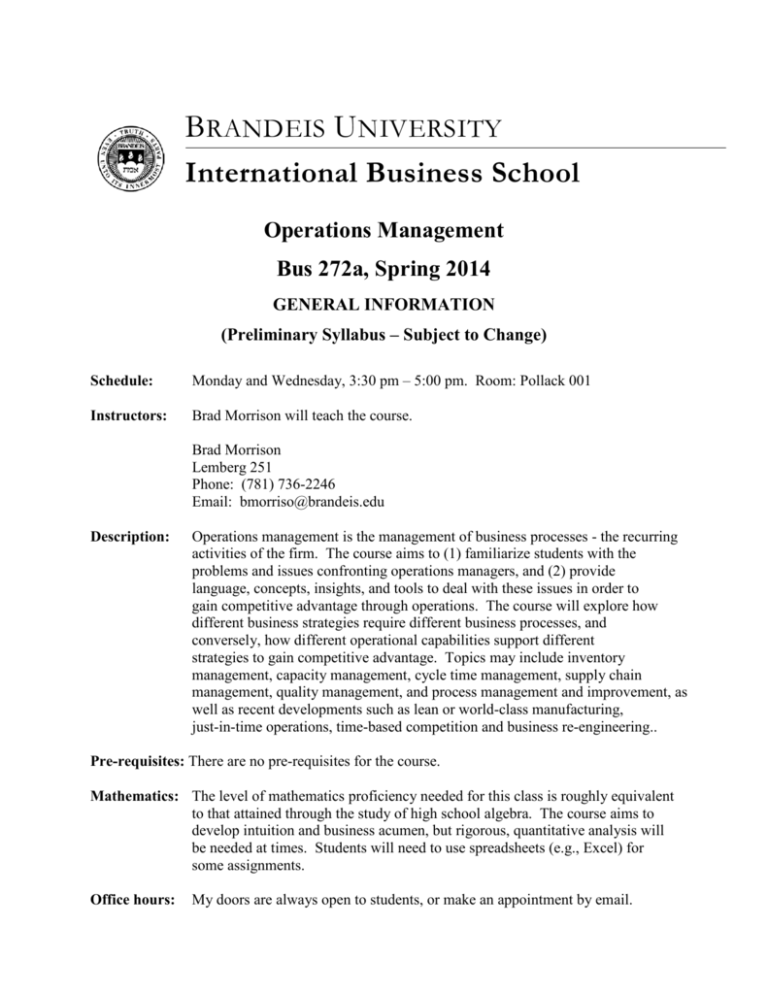
BRANDEIS UNIVERSITY International Business School Operations Management Bus 272a, Spring 2014 GENERAL INFORMATION (Preliminary Syllabus – Subject to Change) Schedule: Monday and Wednesday, 3:30 pm – 5:00 pm. Room: Pollack 001 Instructors: Brad Morrison will teach the course. Brad Morrison Lemberg 251 Phone: (781) 736-2246 Email: bmorriso@brandeis.edu Description: Operations management is the management of business processes - the recurring activities of the firm. The course aims to (1) familiarize students with the problems and issues confronting operations managers, and (2) provide language, concepts, insights, and tools to deal with these issues in order to gain competitive advantage through operations. The course will explore how different business strategies require different business processes, and conversely, how different operational capabilities support different strategies to gain competitive advantage. Topics may include inventory management, capacity management, cycle time management, supply chain management, quality management, and process management and improvement, as well as recent developments such as lean or world-class manufacturing, just-in-time operations, time-based competition and business re-engineering.. Pre-requisites: There are no pre-requisites for the course. Mathematics: The level of mathematics proficiency needed for this class is roughly equivalent to that attained through the study of high school algebra. The course aims to develop intuition and business acumen, but rigorous, quantitative analysis will be needed at times. Students will need to use spreadsheets (e.g., Excel) for some assignments. Office hours: My doors are always open to students, or make an appointment by email. 2 Grading Emphasis: Class participation: Case Write-ups, Assignments, and OM Simulation: Mid-term Examination Factory tour and exercise write-ups Process Improvement Project and Vignette 15% 35% 30% 15% 10% Disability: If you are a student with a documented disability on record at Brandeis University and wish to have a reasonable accommodation made for you in this class, please see me immediately. Please keep in mind that reasonable accommodations are not provided retroactively. Academic Integrity: You are expected to be familiar with and to follow the University’s policies on academic integrity (see http://www.brandeis.edu/studentlife/sdje/ai/). Instances of alleged dishonesty will be forwarded to the Office of Campus Life for possible referral to the Student Judicial System. Potential sanctions include failure in the course and suspension from the University. Course Requirements The course integrates three parallel streams of learning activity: case preparation and classroom discussion, readings including the core textbook, and homework assignments. Much of what should be learned in this class takes place outside the classroom, in homework assignments and through group discussion. Students are required to hand in their written assignments in groups and are encouraged to use these groups to discuss case preparation. Each group should have three members and must plan to stay together for the entire semester. Assignments The course aims to engage you in the issues, to teach you ways to think about and analyze operational problems, and to prepare you to be effective managers. The course assignments are designed in support of these objectives. The readings and assignments will generally require an average of about three hours of preparation per class meeting. If you find yourself averaging more than three hours of preparation per session, please let us know. Some case preparations, notably National Cranberry, may take considerably more than three hours. This will, however, be made up by some other classes that ask for less preparation. Class Discussion A typical class session starts with the instructor asking one or more students to begin the discussion by addressing specific questions. You should have no difficulty in handling such a lead-off request if you have thoroughly prepared the case or reading. After a few minutes of initial analysis and recommendations, the discussion will be opened to the rest of the class. As a group, we will try to build a meaningful analysis of the situation and address the problems and issues it presents. We will also talk about the implementation of recommendations we develop. Criteria that might be used for judging effective class participation are: 1. Relevance, 2. Insightfulness (in analysis, observation, or questions), 3 3. Constructiveness in the context of the class discussion flow, 4. Depth of analysis, 5. Clarity and brevity. In-class contribution will consist mainly of voluntary contributions, although I may call upon students, usually to answer opening questions. (Although cold calling may increase anxiety, “supportive” cold calling encourages you to be better prepared for class and as a result improves the overall class discussion.) A thorough preparation of the assigned materials is all that is necessary for such leadoff questions. If you feel uncomfortable with being called on in class please let me know in advance. Case Write-Ups Case analysis and write-ups, done in groups, will be required for several designated cases. Each case write-up should address key questions in the case, which will sometimes be provided by the instructor. In preparing your presentation, please adhere to the following guidelines: ⇒ Be concise and well-structured: Recommendations should be summarized on one page (you may add exhibits). ⇒ Be to the point: Know that you write to someone who knows the facts of the case; focus on your explanation, and making a clear case for, your recommendations. ⇒ Be punctual: Late submissions will be penalized. More information regarding case write-ups will be provided when the first case is assigned. Texts and Readings Course Reading and Exercise Materials: 1. Managing Business Process Flows, 2nd Edition, by Anupindi, Chopra, Deshmukh, Van Mieghem and Zemel. Prentice Hall, 2006. 2. Several cases available from HBS Publishing will be required. Students may purchase these cases from the HBSP site for this course. Further instructions for downloading will be available when these cases are needed. Additional readings will be handed out on an occasional basis. 3. Some cases will be posted on LATTE. The CRU Computer Rental (Kellogg Case) can be downloaded from http://www.prenhall.com/anupindi. Go to the web site, click begin, go to student resources, find the case and download it. 4. Chapter 6 Supplement: Linear Programming, from Stevenson, William J., Operations Management, 8th Edition, 2005. (Available online directly from McGraw-Hill.) 5. The Goal by Goldratt and Cox. Publisher: North River Press, 2nd edition, 1992. 6. Littlefield Simulation, a web-based simulation exercise. Students will be required to purchase a license from Responsive Learning Technologies to use the simulator for a class exercise and assignment. Purchase information for access codes will be provided in class. 7. Supplemental reading to support the Process Improvement Module. Details will be provided in class. 4 8. Students may be required to purchase bus passes for transportation to our factory tours. The Goal is written as a novel, making for light reading, and some sections are quite entertaining. Nevertheless, it is 337 pages long, so you are encouraged to start reading now. Suggested Readings These readings are not required, but you may find them interesting. The books are non-technical in nature. 1. The Machine that Changed the World: The Story of Lean Production by James P. Womack, Daniel T. Jones and Daniel Roos, Harper Perennial, 1991. 2. Clockspeed, by Charles H. Fine, Perseus Books, 1998. 3. Plant and Service Tours in Operations Management by Roger W. Schmenner, Fourth edition, Macmillan Publishing Company, 1994. 5 OPERATIONS MANAGEMENT Bus 272a S14 DRAFT SYLLABUS DETAILS OF THE SYLLABUS WILL CHANGE. THIS VERSION IS AN OUTLINE OF TOPICS WE WILL COVER. Date Due Class Module and Description 1/13 M 1 Introduction Operations Management: What and why? 1/15 W * 2 Strategy and process spectrum 1/20 - 27 1/29 W * 2/3 M 3 4 2/5 W 5 2/10 M 6 2/12 W 7 2/17-19 2/24 2/24 W * W 8 2/26 M 9 3/3 M 10 3/5 3/5 M * W 11 3/10 M 12 3/12 3/13 W Th * 13 No Class Strategy and process spectrum Process Analysis & Applications Process measures & Little’s law Process flow analysis Flow time & capacity analysis Inventory Management Inventory basics & economies of scale No Class - Winter Break Problem Set I Due Introduction to the Economic Order Quantity Dealing with uncertainty Safety stock and levers for improvement Optimal Service Levels The Newsvendor Model Problem Set II Due Operations Management in Action (TBD) Review of Process Analysis and Inventory Management Mid-term Examination 5:00 pm - Registration Deadline Littlefield Operations Management Exercise Required Readings Read: MBPF: Chapters 1 and 2 Case: Shouldice Hospital Limited Case: Wriston Manufacturing Read: MBPF: Chapter 3 Read: MBPF: Chapter 4 Case: CRU Computer Rental Read: MBPF: Chapter 5 Read: The Goal (up to p 161) Case: Cal’s Calzones Read: MBPF: Chapter 6 Read: MBPF: Chapter 6 Read: MBPF: Chapter 7 Read: MBPF: Chapter 7 Possible extended session Prepare: Assigned Questions Failure to register by the deadline will result in a grade of zero for the assignment. 6 3/13 Th 3/17 M 3/18 Tu 3/19 3/20 W 3/24 3/24 3/27 14 15 * M 16 3/26-4/1 4/2 * 4/2 W 17 4/7 M 18 4/9 4/9 W * W 19 4/14 M * 20 4/16-21 4/23 W * 21 4/28 M 22 TBD TBD * • • • • • • • • • • • • 23, 24 25, 26 Littlefield Operations Management Exercise, Part 1 Begins Decision Analysis in Operations Formulating Linear Programs Littlefield Operations Management Exercise, Part 1 Ends Solving Linear Programs Littlefield Operations Management Exercise, Part 2 Begins Littlefield Part 1 Write-up Due Applications of Linear Programs Littlefield Operations Management Exercise, Part 2 Ends No Class Littlefield Part 2 Write-up Due Applications: Process Improvement Process Evaluation and Re-design Tools of Process Mapping Operations in Action In-Class Exercise Problem Set III Due Managerial Challenges in Operations: Making Things Happen Applications: Supply Chain Management - Global Issues No Class - Spring Break Process Improvement Vignette Presentations Group I Process Improvement Vignette Presentations Group II Extended sessions for exercises Factory Tour(s) Reading: Stevenson Excerpt Reading: John Pinot’s Winery Reading: Stevenson Excerpt Case: CVS Reading: Supplement, TBD “IKEA’s global sourcing challenge: Indian rugs and child labor” Some minor assignments that will be required submissions are not listed here. Shouldice Hospital Capacity Analysis, Due January 15 Wriston Case Memo, Due January 29 Problem Set I, Due February 24 Problem Set II, Due March 5 Mid term Examination, March 12 Littlefield Part 1 Write-up, Due March 24 Littlefield Part 2 Write-up, Due April 2 Problem Set III, Due April 9 Process Improvement Vignette, Due April 23 (Group I) or April 28 (Group II) Attendance at the last class is mandatory Scheduling of factory trips is in process. A brief write-up analyzing the factory operations will be required.
